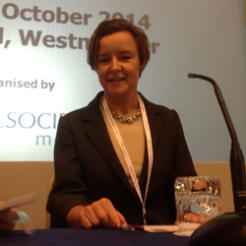The financial perspective is not the only determining factor in arriving at the right decision, says Andrew Hind.
All of us at Charity Finance were very pleased that Paula Sussex chose to make her first public speech since becoming chief executive of the Charity Commission at our Charity Finance Summit, held in London last month.
Press reports of an impressive speech concentrated on her statement that the Commission is now focusing more on “robust regulation”, and will no longer allow charities the benefit of the doubt.
In the current climate one can understand why Sussex wants the Commission to be “tougher, smarter and more proactive”. But she must also find a way to ensure that the sector’s one million volunteer trustees continue to feel supported by a regulator which recognises that charity boards – doing their best with limited resources – will often make honest mistakes.
What wasn’t reported from Sussex’s speech was her explanation about why she chose our conference, with 450 charity finance specialists present, to make her first public comments as Commission CEO. It was, she said, because finance professionals have a critical role to play in ensuring that their charities “do their bit to uphold public confidence”, by behaving with integrity and being accountable.
This recognition of the critical role played by the charity finance community in promoting public confidence in individual charities, and in the sector as a whole, was a point very well made.
But it also got me thinking that when financial issues are being discussed around the trustee board table, and in audit and investment subcommittees, the non-financial ‘lay’ voice must also be heard – and properly listened to.
I’m not sure that the editor of Charity Finance should be writing this – but the fact is that finance professionals don’t always get it right. Or, to be more precise, the financial perspective on an issue is a critical one but it’s not the only determining factor in a charity reaching the best overall conclusion in a given set of circumstances.
Take Comic Relief as an example. Its investment approach was criticised at the end of last year in a BBC Panorama programme. The charity’s investment committee comprised nine people – all of whom were either investment or finance professionals. The committee duly delivered very good investment returns, but there was no one from a non-financial background who might well have asked the critical ‘elephant-in-the- room’ question: “These returns are excellent, but what do our donors think about the fact that we don’t have an ethical investment policy?”
As Valerie Jolliffe says in her article, “fund managers often find questions from the least experienced trustees to be the most penetrating and pertinent”.
Diversity of views essential
It’s exactly the same in an audit committee. The perspective of a trustee with a non-financial background will always add to the richness of the discussion and ensure that judgements are not being made purely on the basis of a technical analysis of the issues. Within any board or committee, diversity of views is essential.
I therefore congratulate the Charity Commission and OSCR on making it clear in their current recruitment advertising for new members of the Sorp Committee that individuals “with non-accounting backgrounds are welcome” to apply.
An experienced FD is a prerequisite for any high-performing charity these days. But engaging the views of non-accountants, with different perspectives, in the big financial issues will always enrich the final decision.









